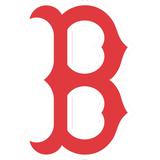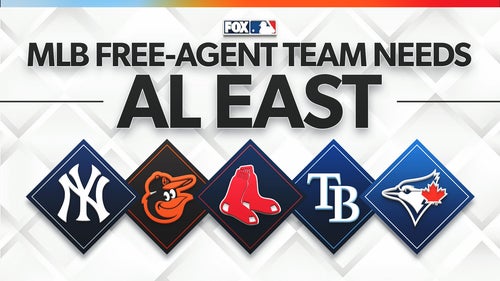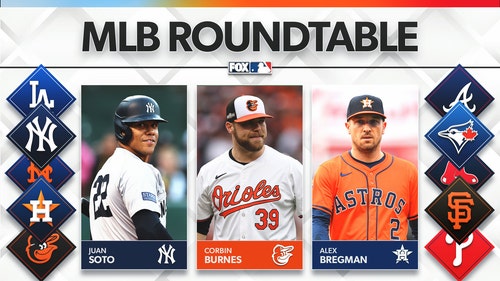
JAWS and the 2017 Hall of Fame ballot: One-and-done players, Part 2
Continuing the final phase of my 2017 BBWAA Hall of Fame ballot breakdown, here is the second installment of first-time candidates whose stays on the ballot are likely to be short, as they won’t receive even the 5% of the vote necessary to retain eligibility. That’s no great injustice, given that their JAWS are at least 18 points below the standards at their positions (my threshold for longer write-ups is generally within 20 points, but the calendar and common sense didn’t allow for that this year). All the same, these players' careers are worth another look before they head off into the sunset. Some were Hall of Fame-caliber talents whose bodies couldn’t hold together for long enough to make a serious bid for Cooperstown. Others were late-bloomers for whom reaching the 10-year minimum required to appear on the ballot was a triumph unto itself.
My annual project would not be complete without including them. This is the 14th year I’ve evaluated candidates using JAWS (which didn’t acquire its catchy name until a little over a year in), and I’ve never let one go by. In the first installment, I covered the ballot’s one-and-done pitchers, catchers and first and second basemen. Up next are the shortstops and third basemen, with the outfielders in the final installment.
Orlando Cabrera
| player | career | peak | jaws | h | hr | sb | avg/obp/slg | ops+ |
| Orlando Cabrera | 21.4 | 19.8 | 20.6 | 2,055 | 123 | 216 | .272/.319/.390 | 84 |
| Avg. HOF SS | 66.7 | 42.8 | 54.8 |
Only two of the 20 Colombia-born players ever to reach the majors have lasted the 10 years necessary to appear on a Hall of Fame ballot, and both are on this year’s ballot. The connections between Cabrera and Edgar Renteria (more on whom below) go far deeper than that. Cabrera's father, Jolbert Cabrera Sr., was the scout who signed Renteria to a contract with the Marlins in 1992, and while the younger Cabrera once idolized his countryman, circa 2008, the two players were said to be involved in an ongoing feud connected to the development of youth and professional baseball in the soccer-crazed country. It’s not known whether they’ve mended fences.
Jolbert Jr., Orlando's older brother by 23 months, signed with the Expos in 1990; he never played for them but spent parts of eight seasons ('98–2004, '08) in the majors with four teams. Orlando signed with the Expos in 1993, beat his older brother to the majors by seven months and spent 15 years ('97–2011) in the majors with nine different teams, five of whom went to the playoffs with him as their starter. Though he never made an All-Star team, he won two Gold Gloves plus a World Series ring with the Red Sox in 2004 after a shocking trade via which he replaced Nomar Garciaparra.

Cabrera debuted for the Expos in September 1997, spent a few weeks playing regularly at second base in '98 and took over the starting shortstop job at the end of July when Mark Grudzielanek was dealt to the Dodgers. From '98 to 2003, he demonstrated moderate pop for the position, batting .269/.317/.416 and averaging 12 homers with a high of 17, but in that offense-heavy era, his 86 OPS+ at times offset the value of his glove work; only twice in that span was he worth more than 2.0 WAR. On July 31, 2004, he was dealt to the Red Sox in a four-way, eight-player deal that sent Garciaparra, who had battled injuries and struggled defensively, to the Cubs. Cabrera stabilized the position, hitting .294/.320/.465 and delivering 1.8 WAR over the final third of the season, then .288/.377/.356 with 11 RBIs in the postseason.
Coincidentally enough, Boston's World Series win had been over Renteria and the Cardinals, and it was Cabrera's Colombian counterpart whom the Red Sox signed to play shortstop via a four-year, $40 million deal that winter. Cabrera didn't do too badly, signing for four years and $32 million with the Angels. He averaged 2.8 WAR over the next three years, helping the Halos to a pair of AL West titles, then delivered similar value to the AL Central-winning White Sox in 2008 after being dealt for Jon Garland. Thereafter, he made short stops in Oakland (2009), Minnesota ('09), Cincinnati ('10), Cleveland ('11) and San Francisco ('11) with diminishing returns.
Carlos Guillen
| player | career | peak | jaws | h | hr | sb | avg/obp/slg | ops+ |
| Carlos Guillen | 27.7 | 24.1 | 25.9 | 1,331 | 124 | 74 | .285/.355/.443 | 111 |
| Avg. HOF SS | 66.7 | 42.8 | 54.8 |
Part of a wave of Venezuelan amateurs signed by the Astros in the early-to-mid 1990s (Bobby Abreu, Richard Hidalgo, Melvin Mora, Johan Santana and many more), Guillen never played for Houston. Instead, he and fellow Venezuelan Freddy Garcia were two of the three players traded to the Mariners for Randy Johnson on July 31, 1998. If filling the Big Unit's shoes were a tall task, it was nothing compared to the one he took on in 2001: serving as the Mariners' regular shortstop after Alex Rodriguez's departure via free agency. While Guillen did an acceptable job in that regard, it wasn't until the switch-hitting shortstop was traded to the Tigers in January 2004 that his career really blossomed; he made three All-Star teams from '04 to '08 and helped the Tigers to an AL pennant in '06.
Guillen had reached Triple A by the time he was dealt in late 1998. He made his big league debut that September and broke camp with the big club the following spring, but a torn ACL in April ended his season. Not until July 2000, when Rodriguez and third baseman David Bell suffered injuries, did he begin playing regularly in the majors. Though the 24-year-old Guillen hit just .257/.324/.396 for an 87 OPS+ for the Mariners, his walk-off bunt single in Game 3 of the AL Division Series against the White Sox completed a three-game sweep.
Guillen again hit for an 87 OPS+ in 2001, with flashy glove work (+10 runs) bolstering his value, and the Mariners—fueled by newcomer Ichiro Suzuki and contributions up and down the roster (Garcia's 4.2 WAR led the pitching staff)—won a record 116 games but fell to the Yankees in the ALCS. After two more solid seasons in Seattle, Guillen was traded to the Tigers for two players in January 2004 and broke out to club 20 homers—up from seven the year before—and hit .318/.379/.542. He made his first All-Star team, but another ACL injury ended his season three weeks early, and he was limited to just 87 games due to injuries the following year.

Guillen hit a big .320/.400/.519 with 19 homers and a career-high 6.0 WAR in 2006 and was red-hot in both the Division Series against the Yankees (.571/.625/1.000) and the World Series against the Cardinals (.353/.450/.523), the latter in a losing cause. He made the AL All-Star team in each of the next two seasons, with career highs of 21 homers and 102 RBIs in the first of those years, but his declining range and mounting injury woes cut into his playing time and value. From 2009 to '11, he spent more time on the disabled list than on the field, primarily due to a left shoulder injury and microfracture surgery in his left knee. The litany of woes made the four-year, $48 million extension he'd signed in early 2007 look terrible, as he played just 177 games over his final three seasons.

Edgar Renteria
| player | career | peak | jaws | h | hr | sb | avg/obp/slg | ops+ |
| Edgar Renteria | 32.1 | 25.5 | 28.8 | 2,327 | 140 | 294 | .286/.343/.398 | 94 |
| Avg. HOF SS | 66.7 | 42.8 | 54.8 |
Though his career is inextricably linked to that of countryman Cabrera, Renteria is the one who left the greater imprint on the majors, making five All-Star teams, winning two Gold Gloves and providing World Series heroics for the Marlins (1997) and Giants (2010) that nearly bookended his 16-year career. An early starter who played regularly in the majors at age 19, he once looked like a threat to make a run at 3,000 hits, but his offense and defense declined quickly once he reached his 30s, and he played his last game at age 35.
Renteria reached the majors on May 10, 1996, just under three months shy of his 20th birthday. He hit .309/.358/.399 with 16 steals, +11 defensive runs and 3.2 WAR, then finished second in the NL Rookie of the Year voting behind the Dodgers' Todd Hollandsworth, one of the award’s more forgettable winners. Though the Marlins won the NL wild card in 1997, the 20-year-old shortstop didn't hit much in the regular season (.277/.327/.340 for an 80 OPS+) or the first two rounds of the postseason, but he went 9-for-31 in the World Series against the Indians with three multi-hit games, figuring in a couple of late rallies in Florida's come-from-behind Game 3 win and then going 3-for-5 in Game 7. He was stranded on second after singling in the bottom of the 10th, then drove in Craig Counsell with the series-winning run in the 11th.
The next year, the 21-year-old shortstop swiped 41 bases (but was caught 22 times) and made the NL All-Star team for the first time. After the season, with arbitration looming and Alex Gonzalez waiting in the wings, he was dealt to the Cardinals for Braden Looper and two lesser players—a steal for St. Louis. Year-to-year consistency wasn't Renteria's strong suit, and he was decidedly mediocre (84 OPS+, 1.1 WAR) in 1999, but he averaged a 101 OPS+, +3 DRS and 3.1 WAR from 2000 to '04, with three All-Star appearances and both Gold Glove wins; his biggest year was in '03 (.330/.394/.480 with 13 homers, 34 steals, 100 RBIs and 5.6 WAR). He swung a hot bat in the 2004 Division Series against the Dodgers and then the World Series against Cabrera and the Red Sox, albeit in a losing cause.

Boston signed Renteria to a four-year, $40 million deal that winter, but his struggles afield (-13 DRS) and at the plate (89 OPS+) quickly soured things. He was traded to the Braves for Andy Marte in December 2005, with the Sox kicking in $8 million to be rid of him. He rebounded with back-to-back 4.1-WAR seasons in Atlanta, making his final All-Star appearance in 2006 and hitting a blistering 332/.390/.470 in '07.
Through 2007, Renteria had collected 1,934 hits, the 12th-most of any player though his age-30 season; the Bill James Career Targets tool ("the Favorite Toy") estimated him to have a 37% shot at reaching 3,000. But he quickly slid into replacement-level territory with a trade to the Tigers and then a two-year, $18.5 million deal with the Giants: He was 0.8 wins below replacement level for 2009–10, salvaged only by his 7-for-17, two-homer showing in the 2010 World Series against the Rangers; his three-run homer in the Game 5 clincher provided all the Giants' scoring and cemented series MVP honors. An attempt to replace Cabrera in Cincinnati the following year didn't go well, and he was out of the league at 35.
Melvin Mora
| player | career | peak | jaws | h | hr | sb | avg/obp/slg | ops+ |
| Melvin Mora | 28.2 | 26.0 | 27.1 | 1,503 | 171 | 93 | .277/.350/.431 | 105 |
| Avg. HOF 3B | 67.5 | 42.7 | 55.1 |
A personal favorite whom I declared the 2003 Futility Infielder of the Year back in my blogging days, Mora was a late-bloomer who took a detour to Taiwan, didn't make his major league debut until age 27 and put himself on the map with a memorable postseason performance with the Mets. Improbably, he emerged as a multi-position star—a two-time All-Star, even—in his early 30s after being traded to the Orioles and carved out a 13-year career that included a couple of big contracts, which had to come in handy when providing for the quintuplets his wife gave birth to in 2001.
Mora was tried amateur boxing and professional soccer in Venezuela before being signed by the Astros in 1991. He spent seven seasons in their system, topping out in Triple A, and after reaching free agency, he spent a couple of months with the Mercury Tigers of the Chinese Professional Baseball League before returning stateside and signing with the Mets in mid-1998. Debuting in the majors on May 30, 1999, he played 66 major league games at six positions but made just 39 plate appearances, generally functioning as a defensive replacement for Rickey Henderson. Taking over for an ill Henderson in Game 2 of the NLCS against the Braves, Mora homered, then went on to go 6-for-14 in the series, memorably throwing out Bret Boone at the plate in the 13th inning in the 15-inning Game 5, won by the Mets via Robin Ventura's "Grand Single."

Mora spent the first four months of the 2000 season in a utility role with the Mets, taking over shortstop duties when Rey Ordonez broke his arm. Concerns about his defense led the team to trade for the Orioles' Mike Bordick; Mora was one of four players sent the other way. He continued to play regularly in Baltimore, splitting time between the infield and the outfield, establishing his worth first with glove and then his bat. In 2002, he hit 233/.338/.404 with 19 homers, 16 steals and 4.7 WAR, making starts at all three outfield and both middle infield positions. His 2003 breakout with the bat (.317/.41/.503) earned him All-Star honors but was curtailed by wrist and knee injuries that limited him to 11 games over the final two months. Settling in at third base, his follow-up (.340/.419/.562 with 27 homers and 104 RBIs) was even more impressive; he led the AL in on-base percentage and ranked second in batting average, third in OPS+ (155) and fifth in WAR (5.6).
Mora never equaled that, but he gave the Orioles a decent return on the three-year, $10 5 million extension he signed in early 2004 and then a three-year, $25 million one he signed in mid-'06.; from '05 to '09, he averaged a 101 OPS+ and 2.6 WAR. After leaving Baltimore, he bounced to Colorado and Arizona before disappearing from the scene.
Casey Blake
| player | career | peak | jaws | h | hr | sb | avg/obp/slg | ops+ |
| Casey Blake | 24.9 | 22.1 | 23.5 | 1,186 | 167 | 36 | .264/.336/.442 | 107 |
| Avg. HOF 3B | 67.5 | 42.7 | 55.1 |
By the time Blake joined the Indians via a minor league deal in December 2002, he was 29 years old and had accumulated just 125 big league plate appearances over a four-year span, spending time with the Blue Jays (who drafted him in the seventh round in 1996), Twins (twice) and Orioles. Though he had hit a combined .288/.372/.480 in 444 games at various Triple A stops, it looked as though he'd never shed the "Quad A" tag. But from those inauspicious beginnings, he managed to stick around for another nine seasons, mostly as a productive regular for the Indians and Dodgers.
Blake replaced Travis Fryman at the hot corner in 2003. Finally getting a chance to play, he bopped 17 homers, hit .257/.312/.411 and provided excellent defense (+15 runs) en route to 3.5 WAR. The next year he hit 28 homers to go with a 271/.354/.486 line, and while he had his ups and downs from there, for the 2003–07 period, he gave the Indians a 106 OPS+ with an average of 21 homers and 2.8 WAR per year. The Indians, who lost 94 games in his first year as a regular, won 93 games (but missed the playoffs) in 2005 and then 96 wins and the AL Central title in '07. Blake went 9-for-26 with a homer off Tim Wakefield in the ALCS, including 4-for-10 over the final three games, but the Indians squandered a three-games-to-one lead to the Red Sox and fell one win short of a trip to the World Series.
On July 26, 2008, with the Indians headed toward an 81–81 season and Blake toward free agency, he was traded to the Dodgers for minor league pitcher Jon Meloan and catcher Carlos Santana, the latter of whom has since delivered 151 homers and 21.2 WAR over seven seasons in Cleveland. Blake hit 10 homers over the final third of the season for the Dodgers, helping them win the NL West and get as far as the NLCS. That winter, Los Angeles re-signed the 35-year-old third baseman to a three-year, $17.5 million deal. It shouldn't have worked out, but it did, at least at first; he set career highs in OPS+ (123) and WAR (4.6) in 2009, his age-36 season, and was solid the following year before back, neck and elbow woes required two surgeries and limited him to 63 games in '11. A bid to make the Rockies the following spring fell short, and he was done.





